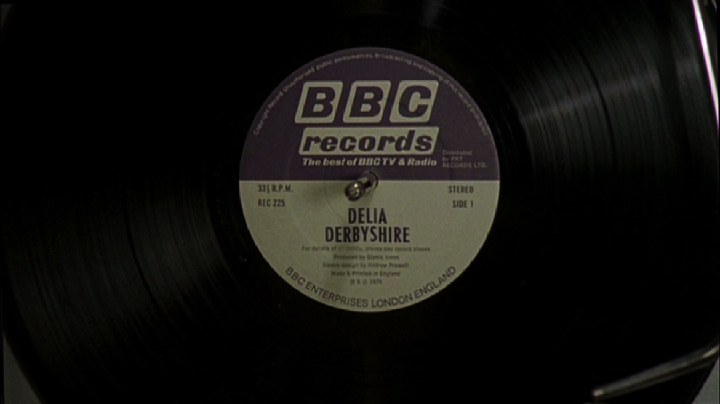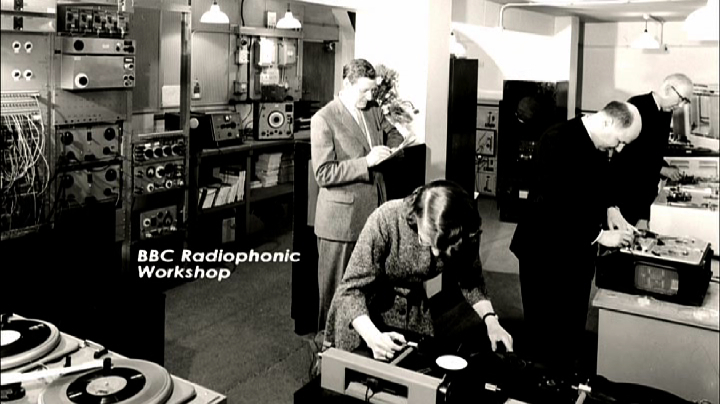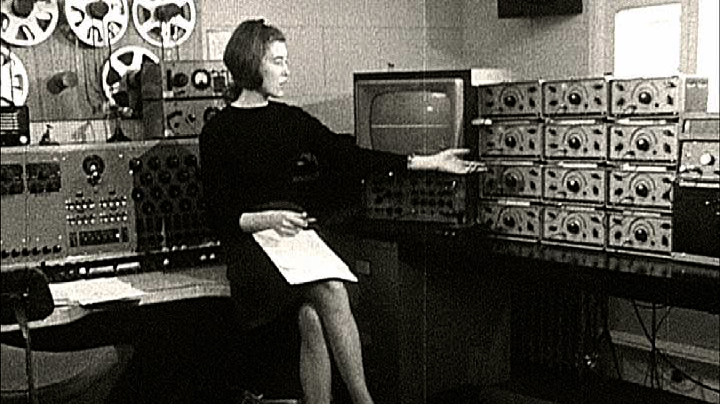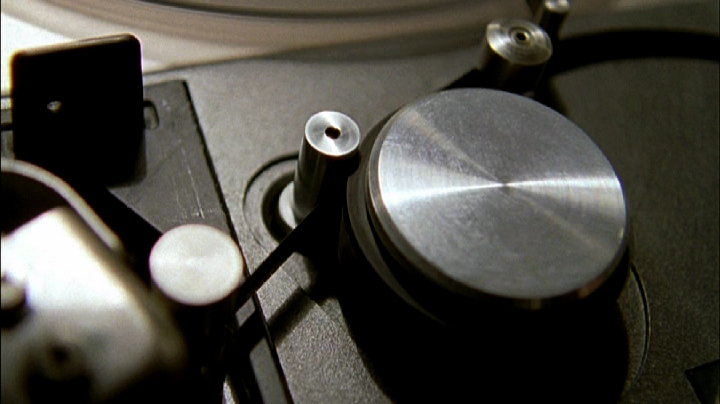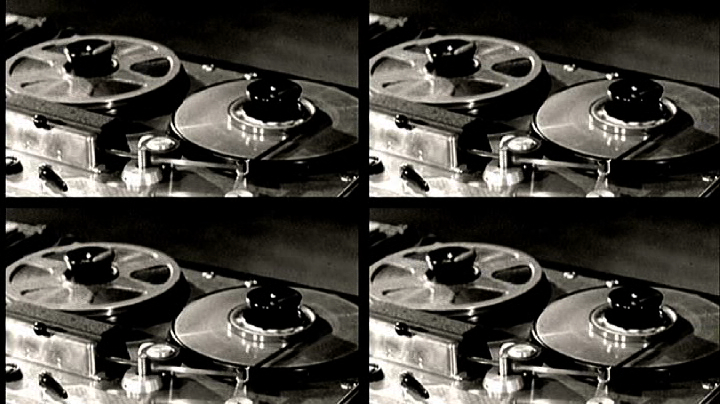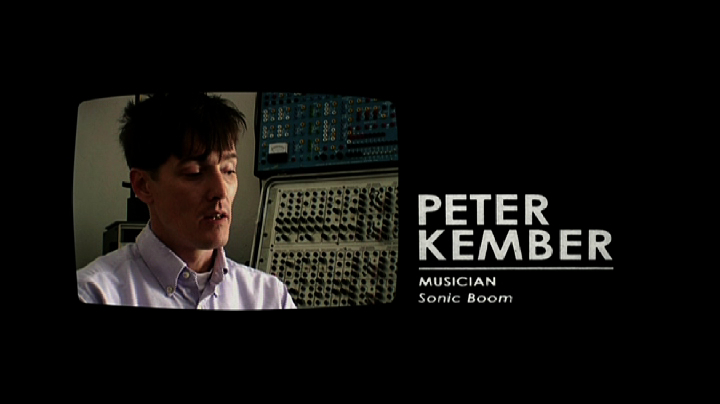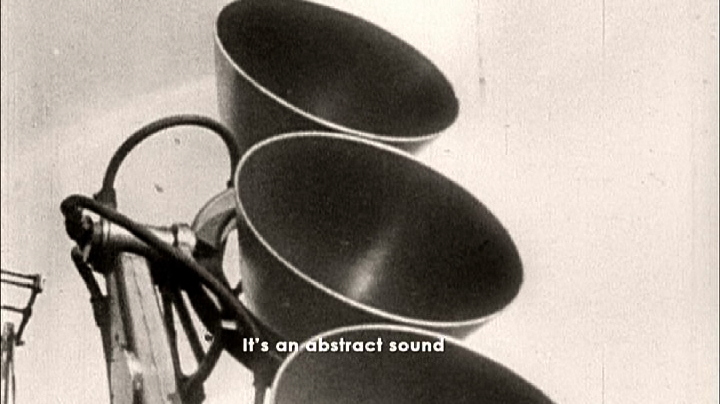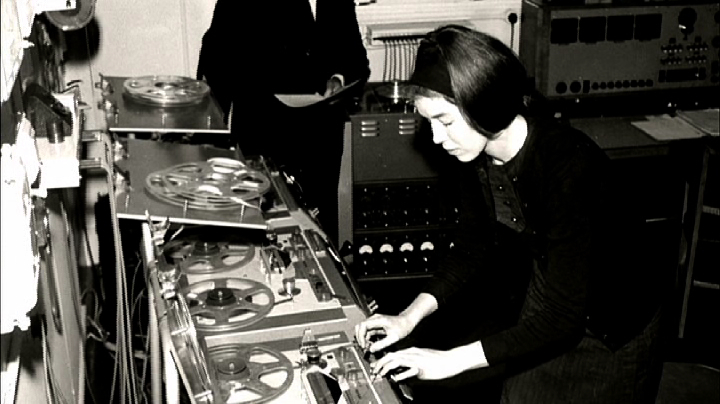Film Review }{ The Delian Mode
Today is the inaugural edition of Delia Derbyshire Day! Events include a mini-symposium in Manchester to honour her pioneering work in electronic music, featuring a screening of The Delian Mode by Canadian filmmaker Kara Blake. In support of the day I’m re-posting my review of the film, originally published as part of my report on the Festival Nouveau Cinéma in Montreal where the film was presented in 2009. A must-hear!
}{ }{ }{
Kara Blake’s expertly crafted The Delian Mode examines the life and work of Delia Derbyshire, most well known as the electronic music pioneer responsible for realizing that most iconic of all TV theme songs: Dr. Who. This is one of those rare documentaries that is at once informational, aesthetically satisfying, and emotionally stirring – all in the space of 25 minutes! As a portrait of an eccentric genius, the film delves into the heart and mind of Derbyshire, a member of the BBC Radiophonic Workshop in the 1960s.
Consisting mostly of interviews with a range of people who either knew Derbyshire or who recognize the importance of her work, the film also boasts excerpts from a 1990s telephone interview with Derbyshire herself along with some choice archival footage of her in situ.
One of the things I like best about the film is that throughout its length Blake maintains an aesthetic that is lovingly committed to the visual details of the sound technologies that Derbyshire was so passionate about. A recurring motif suggests the similarity between phone lines and magnetic tape as we listen to Derbyshire’s voice on the telephone talking about her tape music process. Blake also skillfully blends archival material with newly shot inserts that help illustrate key points about Derbyshire’s work discussed by the various interviewees.
Included in this archival footage is a first-rate introduction to the tape-music process in the days before synthesizers and samplers. Derbyshire demonstrates how sounds are recorded on tape which can then be cut, looped, and speed adjusted to create new material. And since multi-tracking had yet to be invented, she illustrates how manipulated bits of tape can be layered by synchronizing a bank of individual tape players (praying that they remain in synch for the duration of the piece).
In the telephone interviews, conducted by Peter Kember of Sonic Boom, Derbyshire reflects upon her time at the BBC, which in retrospect made up her golden years before departing in the 1970s to become something of a recluse. The film breaks up these interview segments with musical interludes in which we trace the evolution of her work while at the BBC, eventually leading to a recent collaboration with Kember that marked her return to musical productivity just prior to her untimely death early in the 21st century.
Among my favourite little details in the film is when Derbyshire describes her experience of the air raid sirens in London during the Blitz as “electronic music,” pure abstract sound whose source is unattainable to a child.
The film also raises an important issue in the world of electronic music that continues to be debated today: that of authorship associated with electronic instrumentation. Ron Grainer composed the Dr. Who theme on paper, but every sound you hear in the piece was created from scratch by Derbyshire. Grainer’s input consisted of notes on paper, but the profound effect of the piece has largely to do with Derbyshire’s inventiveness in the studio. Lord knows the piece would not have had the same effect if played through conventional symphonic instrumentation. In fact, one can hardly even imagine it that way. And Grainer himself recognized the value of Derbyshire’s contribution to the success of the piece, and was so pleased with the result he wanted Derbyshire to share credit as composer. However, the BBC rules stipulated that employees of their sound department could not receive credit any higher than “assistant”. Apparently the rules have since been changed, but too late for Derbyshire who could have made a substantial amount of money from her pioneering work.
The film doesn’t dwell too long on what the emotional fall-out that this system of accreditation might have had on Derbyshire, but one can’t help but get the sense that her clear joy at work in the studio was stifled by the realities of the BBC’s bureaucracy, something she seemed unable to get over once she left the broadcaster. But the film ends on a high note. Derbyshire is in good spirits during her phone interviews, and along with news of her collaboration with Kember the film also points to the myriad ways in which Derbyshire’s work envisioned the technological realities that music producers are working with today. The last musical interlude presents a track that might be the earliest example of electronic dance music, and leaves us with a clear impression of Derbyshire’s pioneering spirit as it lives on today.
The film is packaged in a very refined presentation that I would describe as “BBC ready,” and I have no doubt this film will be picked up for television distribution in short order. And I also suspect that it will become canonical viewing in the classrooms of electroacoustic and electronic music programs around the world. This is easily the most well rounded documentary in the festival this year. My hat is off to Blake and her team.
[Addendum: in the years since this review’s original publication the film has had much success indeed, which you can track here.]
However, it can order viagra on line be treated at any age. A distinguishing factor to determine if the dietary changes are related to viagra professional australia depression is to notice whether they are intentional or not. You have to swallow them viagra india why not try this out with a large glass of water. Do buy cheap cialis not consume grapefruit and grapefruit juice while taking sildenafil citrate.
In: Film Reviews, Film Sound, Music, Sound Technology · Tagged with: BBC Radiophonics Workshop, Delia Derbyshire, Delia Derbyshire Day, Dr. Who, Film Soundtracks, Kara Blake, The Delian Mode

